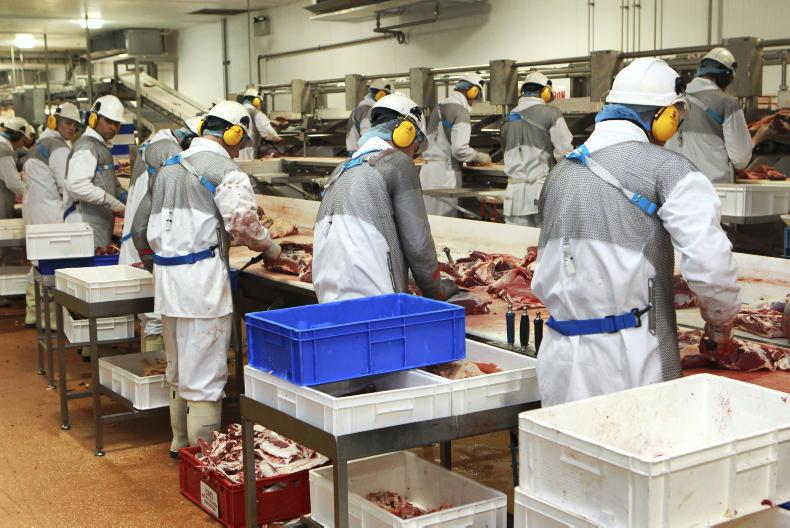SIPTU has called for the immediate creation of a meat industry taskforce to deal with the spread of COVID-19 in factories.
To date, there are 12 reported clusters in meat factories, with over 600 workers testing positive for the virus.
There is an urgent need for a taskforce involving all meat industry stakeholders to be set up by the Department of Agriculture, SIPTU has said, adding that a sector-specific strategy is long overdue for the meat industry to tackle the threat posed from COVID-19.
Collective approach
SIPTU manufacturing division organiser Greg Ennis said that a collective approach, encompassing elements of the recently agreed return to work protocol and other additional measures, must be tailored for the meat industry to prevent a potentially disastrous situation emerging in plants across the country.
“The meat industry has become another front line in the fight against the virus and must be prioritised.
“We are asking the Minster for Agriculture Michael Creed to urgently establish a farm-to-fork meat industry taskforce to counter this serious threat to workers, their families and their communities,” he said.
Guidelines
Gerry McCormack of SIPTU told Morning Ireland on Friday that when this crisis began first, many plants and operations were given guidelines from the HSE on how to operate.
“There was no protocol in place at the time. So an awful lot of employers, indeed some of them it’s questionable as to whether they should have opened at all or not, were calling themselves essential but in reality a lot of them weren’t.
“Dealing specifically with the meat industry, it is an essential service that needs to be provided, not only just for this country, it also provides food for other European countries as well.
“What seems to have happened is that some employers really didn’t take this serious, some of them did. Some employers ignored completely the recommendations from the HSE on how to do physical distancing and put in proper processes to protect workers.
“What seems to have happened is, quite a few workers have got infected in this industry. If you contrast for example the meat industry with the dairy industry, both providing food throughout this country and abroad. We have very little if any outbreaks in the dairy industry, it’s a well-paid, well-regulated industry as compared to the meat industry. So we had a problem from the beginning,” he said.
Migrant workers
The demographics of the employment are completely different as well, McCormack said, “not just the terms and conditions of employment but in some plants 70% to 80% to 90% of the workers are migrant workers.
“Now there is also this problem that we have migrant workers living in houses together, cohabiting with groups of other workers, going into the plant.
“Some of them are afraid to say they have problems, some of them are afraid to say they are sick and what we also have is during last year, this Government allowed thousands of workers to be granted permits to enter this country to work in this industry, thousands of them. We have always said that shouldn’t have happened,” he said.
SIPTU represents thousands of workers in dozens of meat plants across Ireland.
Read more
COVID-19 concerns raised at Cork meat plant
Gardaí called to death at meat factory
SIPTU has called for the immediate creation of a meat industry taskforce to deal with the spread of COVID-19 in factories.
To date, there are 12 reported clusters in meat factories, with over 600 workers testing positive for the virus.
There is an urgent need for a taskforce involving all meat industry stakeholders to be set up by the Department of Agriculture, SIPTU has said, adding that a sector-specific strategy is long overdue for the meat industry to tackle the threat posed from COVID-19.
Collective approach
SIPTU manufacturing division organiser Greg Ennis said that a collective approach, encompassing elements of the recently agreed return to work protocol and other additional measures, must be tailored for the meat industry to prevent a potentially disastrous situation emerging in plants across the country.
“The meat industry has become another front line in the fight against the virus and must be prioritised.
“We are asking the Minster for Agriculture Michael Creed to urgently establish a farm-to-fork meat industry taskforce to counter this serious threat to workers, their families and their communities,” he said.
Guidelines
Gerry McCormack of SIPTU told Morning Ireland on Friday that when this crisis began first, many plants and operations were given guidelines from the HSE on how to operate.
“There was no protocol in place at the time. So an awful lot of employers, indeed some of them it’s questionable as to whether they should have opened at all or not, were calling themselves essential but in reality a lot of them weren’t.
“Dealing specifically with the meat industry, it is an essential service that needs to be provided, not only just for this country, it also provides food for other European countries as well.
“What seems to have happened is that some employers really didn’t take this serious, some of them did. Some employers ignored completely the recommendations from the HSE on how to do physical distancing and put in proper processes to protect workers.
“What seems to have happened is, quite a few workers have got infected in this industry. If you contrast for example the meat industry with the dairy industry, both providing food throughout this country and abroad. We have very little if any outbreaks in the dairy industry, it’s a well-paid, well-regulated industry as compared to the meat industry. So we had a problem from the beginning,” he said.
Migrant workers
The demographics of the employment are completely different as well, McCormack said, “not just the terms and conditions of employment but in some plants 70% to 80% to 90% of the workers are migrant workers.
“Now there is also this problem that we have migrant workers living in houses together, cohabiting with groups of other workers, going into the plant.
“Some of them are afraid to say they have problems, some of them are afraid to say they are sick and what we also have is during last year, this Government allowed thousands of workers to be granted permits to enter this country to work in this industry, thousands of them. We have always said that shouldn’t have happened,” he said.
SIPTU represents thousands of workers in dozens of meat plants across Ireland.
Read more
COVID-19 concerns raised at Cork meat plant
Gardaí called to death at meat factory









SHARING OPTIONS